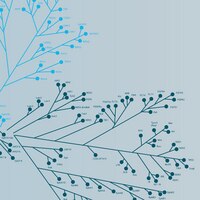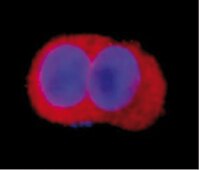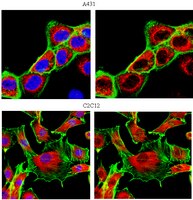Raf-MEK-Erk cascade in anoikis is controlled by Rac1 and Cdc42 via Akt.
Zugasti, O, et al.
Mol. Cell. Biol., 21: 6706-17 (2001)
2001
Mostra il sommario
Signals from the extracellular matrix are essential for the survival of many cell types. Dominant-negative mutants of two members of Rho family GTPases, Rac1 and Cdc42, mimic the loss of anchorage in primary mouse fibroblasts and are potent inducers of apoptosis. This pathway of cell death requires the activation of both the p53 tumor suppressor and the extracellular signal-regulated mitogen-activated protein kinases (Erks). Here we characterize the proapoptotic Erk signal and show that it differs from the classically observed survival-promoting one by the intensity of the kinase activation. The disappearance of the GTP-bound forms of Rac1 and Cdc42 gives rise to proapoptotic, moderate activation of the Raf-MEK-Erk cascade via a signaling pathway involving the kinases phosphatidlyinositol 3-kinase and Akt. Moreover, concomitant activation of p53 and inhibition of Akt are both necessary and sufficient to signal anoikis in primary fibroblasts. Our data demonstrate that the GTPases of the Rho family control three major components of cellular signal transduction, namely, p53, Akt, and Erks, which collaborate in the induction of apoptosis due to the loss of anchorage. | Immunoprecipitation | 11533257
 |
Paclitaxel induces prolonged activation of the Ras/MEK/ERK pathway independently of activating the programmed cell death machinery.
Okano J, and Rustgi, A K
J. Biol. Chem., 276: 19555-64 (2001)
2001
Mostra il sommario
Paclitaxel is a widely used chemotherapeutic agent and is known to induce programmed cell death (apoptosis) in a variety of cell types, but the precise underlying mechanisms are poorly understood. To elucidate these mechanisms, we challenged human esophageal squamous cancer cell lines with paclitaxel and investigated its effects upon signal transduction pathways. Physiologically relevant concentrations of paclitaxel (1-1,000 nm) induced apoptosis. All three mitogen-activated protein kinase (MAPK) family members, c-Jun N-terminal kinase (JNK), p38 MAPK, and extracellular signal-regulated kinase (ERK) were activated upon paclitaxel treatment. Interestingly, JNK activation and p38 MAPK activation were delayed and peaked at 48 h, whereas ERK activity was sustained over 72 h. In addition, Ras activation and MAPK/ERK kinase (MEK) phosphorylation were observed in concordance with ERK activation. While ERK activation was completely ablated by MEK inhibitors, immunoprecipitation and Western blot analysis revealed that neither MEK-1 nor MEK-2 was involved, but instead another member of the MEK family may potentially participate. Although pretreatment with a general caspase inhibitor, benzyloxycarbonyl-Val-Ala-Asp-fluoromethylketone rescued the cell death, it did not prevent Ras or ERK activation. Furthermore, inhibition of JNK, p38 MAPK, or MEK did not alter PARP cleavage and the cell death induced by paclitaxel. These results in aggregate suggest that the delayed activation of JNK, p38 MAPK, and ERK was not linked to activation of the cell death machinery. | Kinase Assay | 11278851
 |











